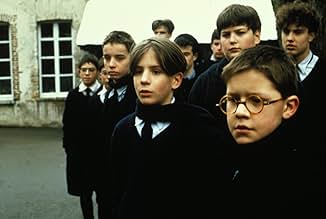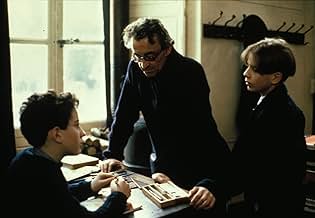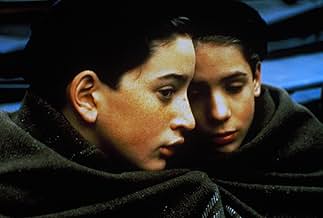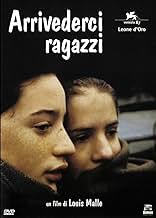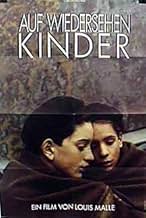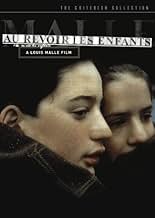Ein von Priestern geleitetes französisches Internat scheint inmitten des Zweiten Weltkriegs ein sicherer Zufluchtsort zu sein, bis ein neuer Schüler dazukommt. Er teilt das Zimmer mit dem be... Alles lesenEin von Priestern geleitetes französisches Internat scheint inmitten des Zweiten Weltkriegs ein sicherer Zufluchtsort zu sein, bis ein neuer Schüler dazukommt. Er teilt das Zimmer mit dem besten Schüler seiner Klasse. Zunächst Rivalen, verbindet die Zimmergenossen bald eine enge ... Alles lesenEin von Priestern geleitetes französisches Internat scheint inmitten des Zweiten Weltkriegs ein sicherer Zufluchtsort zu sein, bis ein neuer Schüler dazukommt. Er teilt das Zimmer mit dem besten Schüler seiner Klasse. Zunächst Rivalen, verbindet die Zimmergenossen bald eine enge Freundschaft und ein Geheimnis.
- Für 2 Oscars nominiert
- 28 Gewinne & 12 Nominierungen insgesamt
- François Quentin
- (as Stanislas Carré De Malberg)
- Moreau
- (as Luc Étienne)
Empfohlene Bewertungen
A particularly effective scene is in the restaurant. There are some Wehrmacht officers at a table, but they keep to themselves. Then the Milice enters and orders a Jewish patron out of the restaurant. The Wehrmacht officers then order the Milice to leave. This emphasizes not only the role of the Vichy government, but also the role of the collaborators in every country that Germany occupied.
I haven't seen all of Malle's movies, but this is probably the best of his movies that I've seen. The final scene has to be one of the most chilling in cinema history. I recommend the movie.
Set in France during the final years of the Second World War, the events of Au Revoir Les Enfants takes place in a Catholic boarding school and is narrated through the eyes of Julien Quentin; one of the students at the school. The plot covers his relationship with a newly arrived enigmatic student with whom he's at odds at first but the two learn to get along & share a big secret.
Directed by Louis Malle, the film is nicely crafted with many details beautifully captured by its calmly moving camera. The screenplay tries to get an authentic vibe of education in Catholic schools, the conversations between its characters carry the childlike innocence & the performances by its cast, especially the child actors, becomes more captivating as the story progresses.
On an overall scale, Au Revoir Les Enfants (also known as Goodbye Children) isn't in anyway a hard-hitting or emotionally scarring cinema but the gentle manner in which it depicts its premise really makes you care for its characters, makes you wish they get away, makes you wish for a miracle & although its subject matter has been dealt in a better manner, the film is worthy of a watch for its two main characters alone.
The two main characters, Julien Quentin and Jean Bonnet, are beautifully portrayed by two very capable and talented young actors. The supporting cast is equally impressive. The film is directed with a touch of genius, and holds its own when compared to another motion picture masterpiece, To Kill a Mockingbird.
A wrenching, sensitive, all-too-true drama set in a gorgeous French wooded outpost during World War II. The main actors are boys, and they play their parts with unusual conviction, unexaggerated but with intensity. And the anti-Semitism that arises, though inevitable in Nazi territory, comes subtly and really stings. The movie isn't complete without this horror, but the horror is made complete by the really vivid recreation of this kind of private boys school--a period movie at its best.
Director Louis Malle has not only a message, but a sensitive feel for the medium--for making fluid the flow and background of the plots of his films. It's also a fairly complex mix of types, and you can somehow keep them all straight as it goes--as straight as you are meant to as the facts unfold. In the end, it confirms a familiar story of Nazi terror, but one that can't be told too often.
Part of what makes this autobiographical film from Louis Malle so powerful is that a big portion of its coming of age material is universal. In a Catholic boarding school we see hazing and random bullying while ineffectual headmasters look the other way, bedwetting, reading after hours, playground battles, curiosity about girls, and the kind of childhood events that get remembered for life, like getting lost in the woods. In other words, it's just boys trying to get through the difficulties of growing up, and really could be any group of boys, at any time.
But of course this isn't just any period, it's occupied France during WWII, and while the school full of affluent kids seems mostly insulated from that, danger lurks. Three new boys who have been admitted and given new names are secretly Jews, a fact which gradually becomes known by Julien, one of the smarter students (Gaspard Manesse, playing the young Malle). He has a rivalry and a friendship with one of the new boys (played soulfully by Raphaël Fejtö), and the nuances of their relationship not only felt authentic, but it made it hard to know how the film would play out.
I love the dimensions of the film, including the differing Catholic responses to the Jewish issue in Vichy France - some good, some bad. There is also an axis of rich/poor, and I loved the sermon where the priest shocks the visiting parents by criticizing the behavior of the wealthy. Lastly, the use of the Chaplin film 'The Immigrant' (1917) within the film is pitch perfect, and a masterful touch.
Wusstest du schon
- WissenswertesBased on an incident from Louis Malle's own youth. Julien is modeled after Malle.
- PatzerWhen hiking, Julien asks what day it is and is told that it's Thursday, January 17th, 1944. That date was actually a Monday.
- Crazy CreditsPour Cuotemoc, Justine et Chloé. (opening credits)
Top-Auswahl
- How long is Au Revoir les Enfants?Powered by Alexa
Details
- Erscheinungsdatum
- Herkunftsländer
- Offizieller Standort
- Sprachen
- Auch bekannt als
- Au Revoir les Enfants
- Drehorte
- Produktionsfirmen
- Weitere beteiligte Unternehmen bei IMDbPro anzeigen
Box Office
- Bruttoertrag in den USA und Kanada
- 4.542.825 $
- Weltweiter Bruttoertrag
- 4.575.613 $
- Laufzeit
- 1 Std. 44 Min.(104 min)
- Farbe
- Sound-Mix
- Seitenverhältnis
- 1.66 : 1

![Bande-annonce [VOST] ansehen](https://m.media-amazon.com/images/M/MV5BZDlkMTI5OTgtNmU4My00MzRjLWFkNzMtYmMyMDlhNjQ2OTFmXkEyXkFqcGdeQXRyYW5zY29kZS13b3JrZmxvdw@@._V1_QL75_UX500_CR0)
